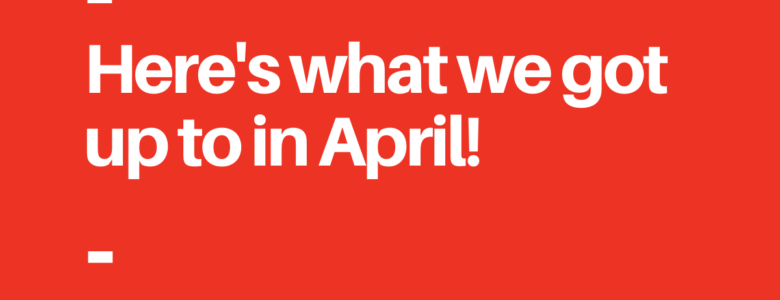
Last Month in DiEM: April — and what’s coming up next
We have just passed one of our favourite holidays of the year: May 1.
In honour of those who have fought for our rights in the past, DiEM25 will continue the fight for a just future. Last month, next month, and all the ones that follow! Read our contributions from April 2021:
DiEM25 News Bulletin
Exclusive keynote speech by Yanis Varoufakis on post-capitalism, its present, its two possible futures and a story in between. Yanis Varoufakis discusses post-capitalism with Dr. Kfir Cohen Lustig, Senior Research Fellow, Academic Director, Globalisation and Sovereignty Cluster at the Van Leer Jerusalem Institute.
What Europe Must do Now
DiEM25 proposed a Progressive Agenda focusing on Public Health, Shared Prosperity and Green Peace, comprising policies drawn from DiEM25’s comprehensive Green New Deal for Europe as well as policy initiatives honed at the outset of the 2020 pandemic.
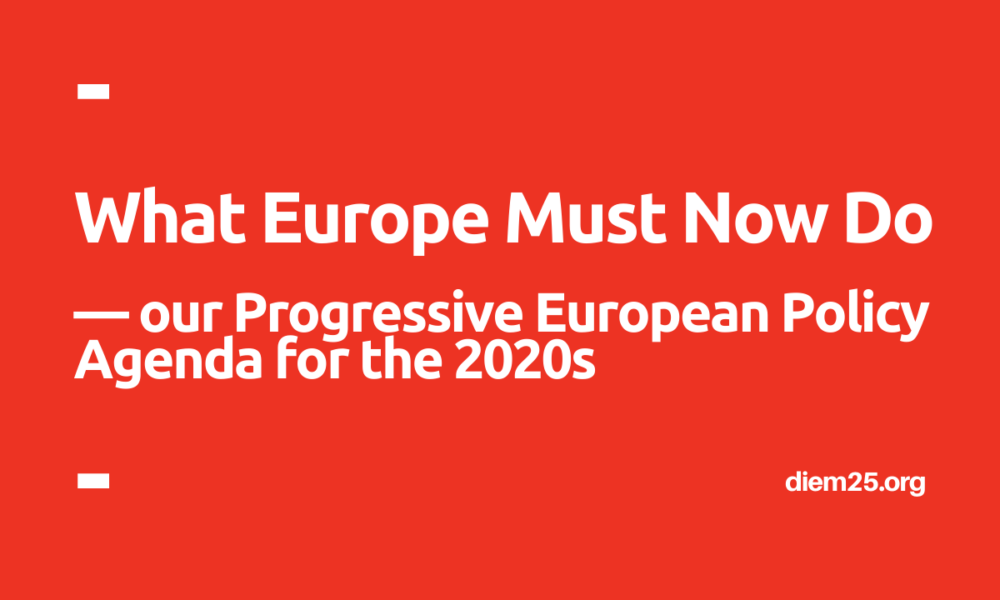
DiEM25 launched its new DiEM Voice website
Against the backdrop of the Covid-19 pandemic and the devastating impact it has had on the arts sector, it became apparent that it was time for DiEM Voice to be revived. So here we are with our brand-new website and we invite you to come be a part of the redevelopment of DiEM25’s arts and culture platform!
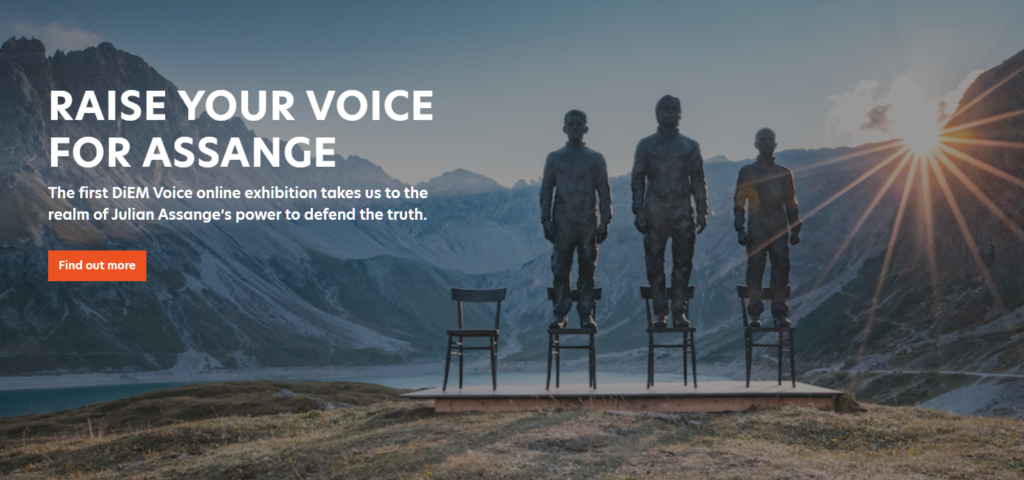
Discussions
Albania
We stood in solidarity with the working people of Albania. The Albanian parliamentary elections are not merely a local issue. They transcend borders and languages in order to bring to the fore a burning matter: the rights of those who work for a living and fight for a just society.
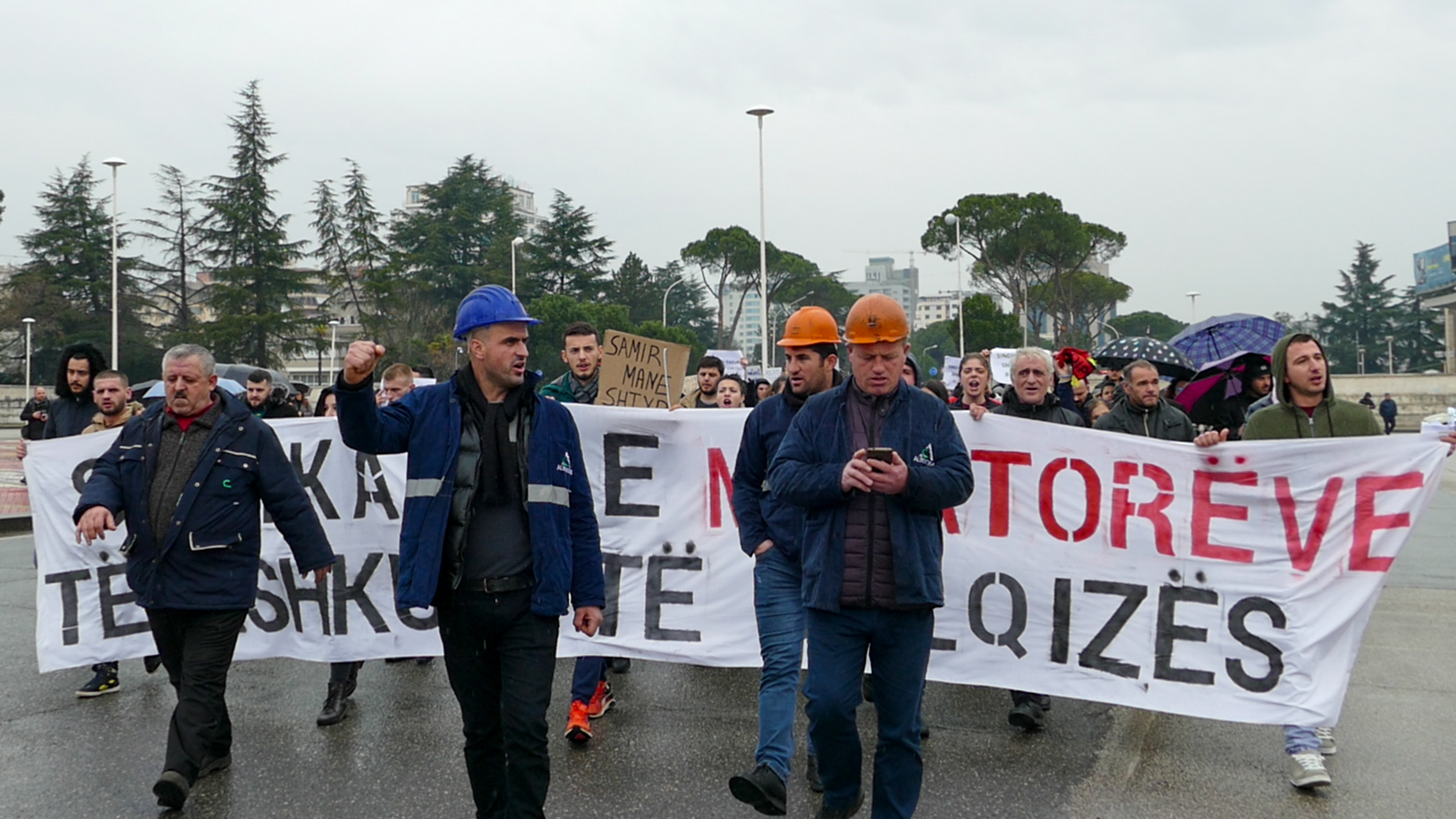
DiEM25 Call Calendar
Visit our events calendar to find all international, national and local events. If you’ve been a member for a while, you can join our coordination meetings to learn what DiEM25 members are doing and how you can get involved. And if you’re new to our movement, do make sure to attend our onboarding meetings to get started!

Join our actions in May!
- Join People’s Gatherings and help DiEM25 develop policies in your country! Have a look at the events page to join the ones closest to you. Nothing happening where you live? Find out more about how to become a Gathering organiser during our bi-weekly open calls.
- Keep an eye on Green New Deal for Europe campaign, because we are kicking off a new collaboration with our DiEM Voice project! In the coming month we will invite you to rise with us and share your stories!
So make sure to follow GNDE Twitter, Facebook and Instagram accounts. - DiEM Voice is now in full swing, creating initiatives to help bring about creativity to DiEM25’s projects and campaigns. Together with GNDE we are embarking on a new campaign “Tell us your story!”, a chance for you to record a video and have your voice heard in regards to things such as housing and healthcare in your local area. More news to come on how to get involved on 17th May!
- This month we will also launch the Voice Design Team: if you are a graphic designer, a video editor or a film maker, and wish to get involved please contact us at [email protected]. Come join us in our next Voice coordination call on Tuesday 18 at 19.00 CEST!
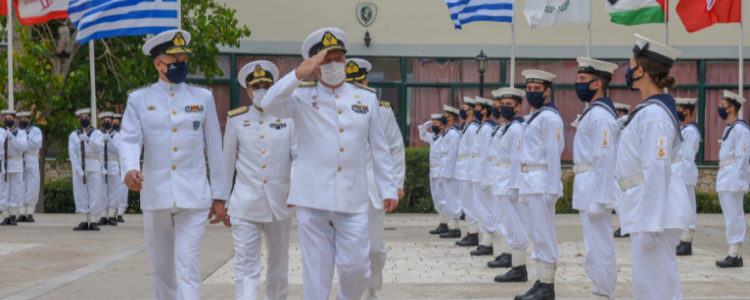
The Left really is out of touch — two months in the Navy showed me why
I have been in the Hellenic Navy for two months. One month in boot-camp on Poros island, and now on Kos island right at the border with Turkey.
During training I caught COVID-19. Not a huge surprise if I’m honest. Only a few of us were allowed into the mess hall at a time. We had to wear two masks, carried and used hand-sanitiser at all times and kept distances during drills and chores. But at the end of the day we always returned to the same 20-people sleeping quarters.
COVID-19 itself was not that bad for most of us, only one guy had to be sent to the military hospital in Athens. The rest of us spent it at the barracks, locked in a concrete block from the 60s, not allowed outside and brought food in disposable Tupperware. No smartphones, no radios or TVs and forced to clean our communal spaces and restrooms ourselves, all while being sick. But we also had a lot of time to just speak with each other, for hours on end.
The people I met come from across the spectrum of society, many of whom I would never have met had I not been conscripted. In a way, that first month of training (before people’s contacts secured them comfortable transfers to cosy units in Athens or wherever is closest to home) was a major equaliser. We were all at the bottom of the food-chain, but we are there together.
The underlying principles of patriarchy which permeate the armed forces, and which attribute to all of us an inherent value simply for being men and doing our duty, bring people together. If only we could extend this sense of empowerment and belonging to everyone. I guess that’s what feminism is all about.
I made friends and shared many laughs with people who I later found out were fascists. One guy’s dad was the head of Golden Dawn for southern Athens. Another chap got me a coffee when I had run out of cash; after we had spent a whole evening chatting and laughing. Later he referred to immigrants as “disgusting illegals”.
The terms used to describe people who are not liked (Turks are Mongols, refugees are illegals, anarchists are unwashed murderers etc.) are disturbing. There is definitely a lot of hatred — and hence fear — among people. Sometimes it came from life experience: I met one chap whose house had been broken into three times by Roma people. And his sister had been sexually assaulted by two boys from the Roma community. He is from a rough part of Athens – I have never even visited it. You can imagine what his stance is on “gypsies”.
This fear experienced by millions, regardless of whether it’s justified or not, is consistently belittled by the Left when minorities are sanctified. The proper response to the demonisation of minorities should be our deep and honest engagement with the matter, not to respond to one extreme (demonisation) with another (sanctification). When they hear us speak about LGBTQI+ rights, the environment, or a number of other issues that they don’t consider pressing, they think: “is that really the Left’s priority right now?”
The stance that “everything is a priority” does not work for people who feel like they are in a fight for their survival. They want to know that their survival is our priority, and when they think it is not, they turn to other representatives for whom it is.
Often what we communicate sounds to them like we are debating universal suffrage before we have even abolished slavery. It’s not that they simply feel alienated by our priorities, but that they perceive them as offensive. We appear out of touch with their reality: a bunch of snobbish middle-class intellectuals who know what’s best based on a book we once read, rather than lived experience.
If we are serious about wanting to re-connect with the working class that the Left has unquestionably lost touch with, we need to start discussing these particularly difficult points.
Many of the people I met were racist. They are sexists and nationalists. But before I realised these things about them I considered them nice people. They were pleasant, funny, and kind.
This juxtaposition — this apparent ethical clash — has made me question what it means for someone to be bad. I still strongly disagree with their views, but I am coming around to thinking that that disagreement cannot be the basis for condemnation.
No one considers themselves the bad guy. Often they don’t even truly like their own stances but consider them an ugly reality of life – one that they have experienced, not read about. And the fact that we, the Left, are in denial about these realities, infuriates them.
Speaking with them was not easy. But the worst thing that could have happened to me while in debate with fellow sailors was for another Leftist to have come along in my support: the arrogant holier-than-thou attitude, the intellectual way of speaking with the readiness to condemn. The conversation would have been over immediately, replaced by fruitless conflict. The reality is that I met many more people in the navy who were ready to listen and have their minds changed about things, than I ever did while volunteering in the Left.
The fact that we are detached from the reality of the working class is not bridged simply by progressive policies which aim to help the working class. If people feel denigrated and misunderstood, they will never listen to you, let alone trust you.
For the time being there are parties on the other end of the political spectrum that feel like a much better fit for those “left behind”. How we decide to move forward will determine whether we are truly interested in re-engaging with the working class or if it’s simply a mantra we keep repeating to feel closer to Marx.

Football Takes Capitalism Out of Bounds
Europe has discovered its moral Rubicon, the frontier beyond which commodification becomes intolerable. The line in the sand that Europeans refuse to cross, come what may, has just been drawn.
We bowed to bankers who almost blew up capitalism, bailing them out at the expense of our weakest citizens. We turned a blind eye to wholesale corporate tax evasion and fire sales of public assets. We accepted as natural the impoverishment of public health and education systems, the despair of workers on zero-hour contracts, soup kitchens, home evictions, and mind-numbing levels of inequality. We stood by as our democracies were hijacked and Big Tech stripped us of our privacy. All of this we could stomach. But a plan that would end football as we know it? Never.
Last week, Europeans showed the red card to the moguls – and their financiers – who tried to steal the beautiful game. A potent coalition of conservatives, leftists, and nationalists, uniting Europe’s north and south, rose up in opposition to a secret deal by the owners of many of the continent’s richest football clubs to form a so-called Super League. To the owners – including a Russian oligarch, an Arab royal, a Chinese retail magnate, and three American sports potentates – the move made obvious financial sense. But from the perspective of the European public, it was the last straw.
Last season, 32 clubs qualified to play in Europe’s Champions League, sharing €2 billion ($2.4 billion) in revenues from television rights. But half of the clubs, teams like Real Madrid and Liverpool, attracted the bulk of the European television audiences. Their owners could see that the pie would increase substantially by scheduling more derbies between the likes of Liverpool and Real Madrid, rather than matches featuring lowly sides from Greece, Switzerland, and Slovakia.
And so it was that the Super League proposal was hatched. Instead of sharing €2 billion between 32 clubs, the top 15 clubs calculated they could divide €4 billion among themselves. Moreover, by creating a closed shop, with the same clubs every year, regardless of how well they perform in their national championships, the Super League would remove the colossal financial risk that all clubs face today: failing to qualify for next year’s Champions League.
From a financier’s perspective, kicking out the laggards and forming a closed cartel was the logical next step in a process of commodification that began long ago. Here was a deal that would quadruple future income streams and remove risk by turning those streams into a securitized asset. Is it any wonder that JPMorgan Chase rushed in to finance the deal with a golden-handshake offer of €300 million to each of the 15 clubs that agreed to leave the Champions League behind?
Whereas the Brexit saga lasted years, this particular breakaway attempt collapsed within two days. Whatever the financial logic behind the Super League, its plotters had failed to consider an intangible yet irresistible force: the widespread conviction among fans, players, coaches, communities, and entire societies that they, not the tycoons, were the true owners of Liverpool, Juventus, Barcelona, and the rest.
And who could blame the owners for not seeing it coming? No one protested when they floated their clubs’ shares on stock exchanges alongside McDonald’s and Barclays. For years, fans watched passively as oligarchs poured billions into a few leading clubs, killing off all real competition by packing their rosters with the world’s great players.
But while the European public could tolerate that the probability of a laggard ever winning anything had fallen close to zero, the Super League would officially take that chance the rest of the way. Maximizing profits would now mean the formal extinction of the possibility even to dream that a lowly team like Stoke City or Athens’ Panionios could one day win the Champions League. The complete elimination of hope, however distant capitalism had rendered it, provided the spark that stopped football’s oligarchy in its tracks.
Meanwhile, in the United States, even cynical sports moguls understand that free-market capitalism chokes competition. The US National Football League is a paragon of aggressive competitiveness, and not only because super-fit players sacrifice their health for wealth, acclaim, and a shot at Super Bowl glory. The NFL is competitive because it imposes on its teams a strict salary cap, while the weakest are guaranteed their pick of the best rookie players. American capitalism sacrificed the free market to save competition, minimize predictability, and maximize excitement. Central planning lives in sin with unbridled competition – directly under the spotlight of American show business.
If the objective is an exciting, financially sustainable football league, the American model is what Europe needs. But if Europeans are serious about their claim that the clubs ought to belong to the fans, players, and communities from which they draw support, they should demand that clubs’ shares be removed from the stock exchange and the principle of one member-one share-one vote is enshrined into law.
The crucial question of whether the oligarchy should be regulated or dismantled extends well beyond sports. Will US President Joe Biden’s spending and regulation agenda suffice to rein in the unbridled power of the few to destroy the prospects of the many? Or does genuine reform demand a radical rethink of who owns what?
Now that Europeans discovered their moral Rubicon, the time may have come for a broader rebellion that vindicates Bill Shankly, the legendary Liverpool manager and staunch socialist. “Some people believe football is a matter of life and death,” Shankly famously said. “I can assure you it is much, much more important than that.”
This article was originally published on Project Syndicate.
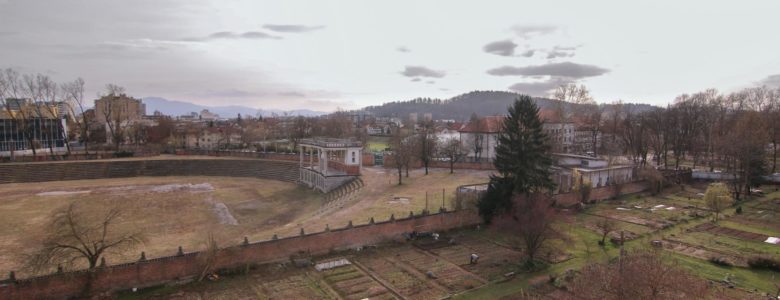
Help us save Plečnik Stadium
Cultural heritage and a central part of our community life is being scrapped for more skyscrapers, shopping malls and casinos. But we are determined to save the Plečnik stadium, and you can help us: sign the petition!
We previously wrote about the Stadium of Ljubljana. And now we are taking it a step further by sending an open letter to the municipality, city council and mayor of Ljubljana, as well as to the Slovenian Olympic Committee, Ministry of Culture, Ministry of environment and spatial planning.
Jože Plečnik is a Slovenian architect whose work significantly co-created the Central European architectural history of the first half of the 20th century. The majority of his work was created in Ljubljana and an important part of his oeuvre is the Bežigrad Stadium, which was built between 1925 and 1935. At the time, the northern suburbs of the city. It was designed as an open-air sports park for recreation, training, competitions and various outdoor events.
After World War II, it operated as the central national football stadium.
In 2010 when Ljubljana built a new contemporary sports stadium, meeting the standards of various sports federations, the Plečnik stadium was closed.
In 2009 the stadium was, together with other Plečnik’s works in Ljubljana, declared a monument of national importance. This status defines a set of extremely strict rules of preservation and possible use.
In 2007, the stadium was partly bought by GSA, a company which belongs to the Elektronček group owned by the entrepreneur Joc Pečečnik. Together with the Municipality of Ljubljana and the Olympic Committee of Slovenia, they founded the company Bežigrad Sports Park (BŠP).
On the stadium and the adjacent plots the company intends to build a huge sports-business-commercial and hotel complex – over 200.000m2 with 2000 underground parking spaces – which the city of 300.000 inhabitants does not need.
Less than 1 kilometre away an even bigger commercial complex is being planned, not to mention an additional one, half built and exposed to decay, right next to the new stadium.
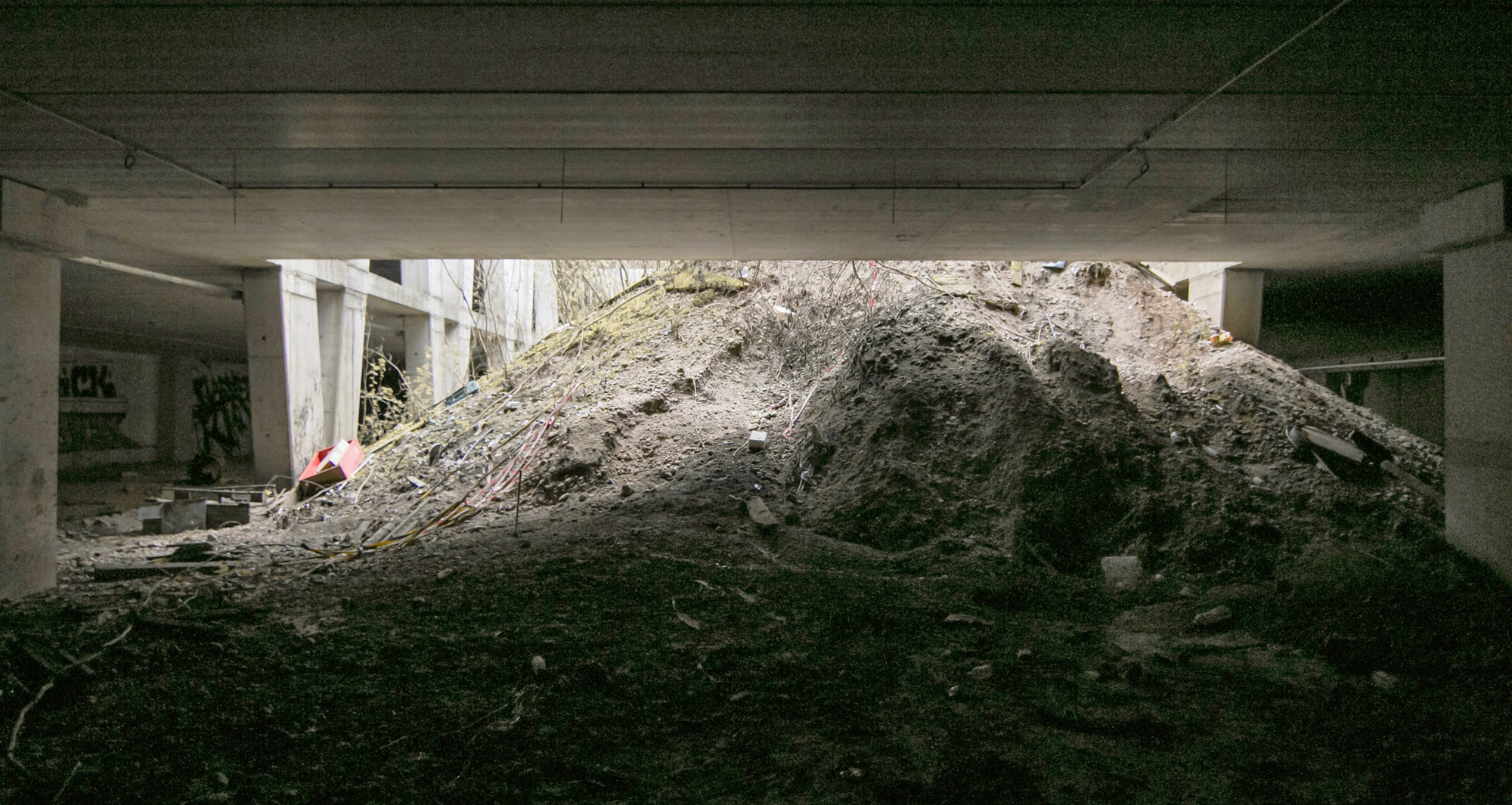
Photo: Maruša Vehovar
The BŠP project completely neglects the prescribed protection regime for the monument and is inconsistent with all international doctrines for the protection of cultural heritage.
But despite the strong and united opposition to the project from the majority of architects, landscape architects and art historians, it has been — since its beginning — surprisingly supported by the directors of the Agency for Protection of Cultural Heritage. The BŠP project has been [falsely] presented all this time as the only feasible way of protecting and maintaining the monument.
However, according to independent studies the renovation works for the stadium would — because of its simplicity — only cost up to 5milion Euros, contrary to the estimated cost of the new development, of about 240milion Euros.
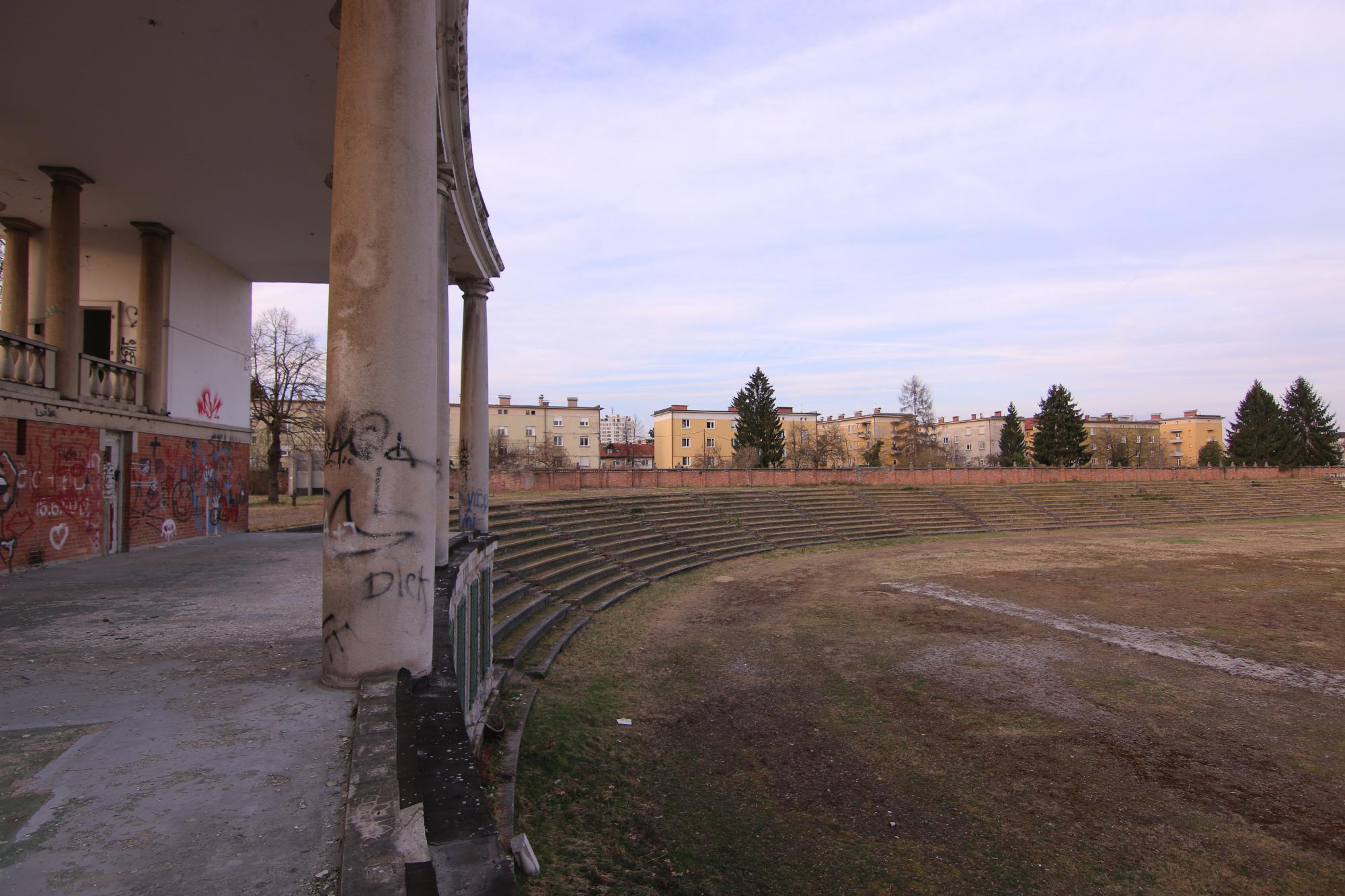
Were the stadium to be returned to its original role of a public open space, the maintenance costs wouldn’t be higher than for any other green park or public square. Not to mention the fact that it would sustain itself through the hosting of occasional open-air events and concerts.
So instead of the construction of yet another shopping centre, which would cause spatial and urban problems, the monument should be renovated to its original form and become a generator of a new life of the community.
This way the stadium would again become a part of Plečnik’s Ljubljana and reacquire the possibility of being nominated for the UNESCO world heritage list.

Sign the petition and help Ljubljana save the Plečnik stadium!
—
If you are from Ljubljana and you’d like to be involved, or if you have knowledge, skills or ideas to contribute on this campaign, please get in touch with us: [email protected]
This campaign is part of DiEM25’s Campaign Accelerator project.
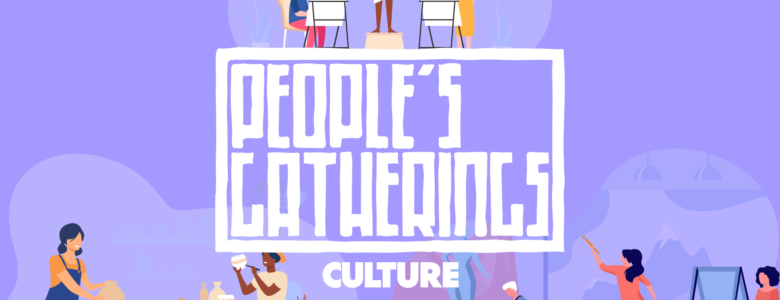
Solutions for the cultural sector in Portugal
People’s Gatherings x DiEM Voice: Cultural Policies in Portugal took place on Thursday, April 15. We’d like to tell you how this Gathering went and highlight its most positive aspects as an example for future People’s Gatherings.
First of all, we kept to schedule! Not only did the Gathering start on time, but it also ended after 1h05 minutes. This is key, especially nowadays when we are all overwhelmed with online meetings that take up too much time.
There were eight attendees, of which three were members of DiEM25 and five were external. All were involved in cultural and artistic fields.

David Marques, a well-known dancer and choreographer, was invited to participate in the Gathering and acted as the ‘expert’. He with us the current state of affairs surrounding labour rights for cultural workers and artists in Portugal.
He participated in the Gathering as the representative of Ação Cooperativista, an informal cultural group that has united many workers, artists and organisations around one goal to defend cultural workers and artists’ labour rights and propose political reform to improve their situation. Ação Cooperativista was formed last year, when the pandemic turned the lives of those who work in the cultural sector totally unsustainable.
Since then, the organisation was recognised by the Portuguese Government, together with other organisations, including Plateia and CENASTE, as a meaningful player to be consulted before taking major decisions.
In this Gathering, we tried to answer one question that came from the current Portuguese political agenda. The Ministry of Culture is developing a statute for artists supposedly to protect them from precarious working and living conditions.
So the question we tackled was: is this new statute protecting artists enough?
David Marques immediately made clear that it wasn’t — due to the fact that the statute doesn’t recognise that most artists and cultural workers do not have steady employment. In this sense, the social measures advanced in the statute are set to exclude most artists and cultural workers. To benefit from it you need to:
- have paid social contributions for 12 months (unemployment subsidy) or
- have paid social contributions for 6 months and then be inactive for 3
months (activity suspension subsidy)
It was very clear to all attendees that the statute that the Government is trying to put in place is a fallacy. It should instead strive to implement a system close to the French one named ‘les intermittents du spectacle’, where artists and cultural workers have access to social benefits when inactive.
Ana Pereira pointed to the lack of recognition of cultural and art work in Portugal, not only coming from society at large but also from workers of the sector themselves. Indeed, Portuguese cultural workers and artists are used to devaluing their work thereby creating a vicious circle of low wages in the sector.
David Marques listed three top priorities to fight for in Portugal:
- A price table, containing minimum prices for each service
- A real ‘intermittent’ statute for artists and cultural workers
- A bigger yearly public budget for Culture
Catarina Santos suggested that cultural and arts’ workers should unite with other workers who also experience precarious working conditions, such as University teachers in Portugal, to make both of their demands stronger.
Mónica Jardim reminded participants that the cultural sector in Portugal represents 3% of the Portuguese GDP. Yet, we are still fighting for the Government to give 1% of its yearly budget to the sector. She wondered what the Municipalities are doing to support the sector locally in the context of the pandemic.
David Marques told participants Ação Cooperativista is participating in the European Commission’s project, Voices of Culture. He criticised it since it assumes artists’ mobility is already achieved in all corners of Europe. In reality, Portuguese artists move away from Portugal, not to have access to mobility programmes, but because they have no choice.
Nadia Sales Grade then asked how participatory this project was. David recognised that this may be one more of those projects which makes citizens believe they are being part of a participatory decision-making process, when in fact it is only a process with no consequences at all.
Nadia also asked David what the role of DiEM25 could be in defending the labour rights of artists labour across Europe. He suggested that DiEM25 could gather information on legislation in different countries, so that these new cultural and political movements could have more information on the different models that exist across Europe.
In conclusion:
- We discussed one main question: does this new statute sufficiently protect artists? The group came to the conclusion that it does not.
- We explored potential future policy paths: a price list, containing minimum prices for each service, a real “intermittent” status for artists and cultural workers, a larger annual public budget for culture and more support from Municipalities.
- We identified ways to empower activism in the fields of culture and the arts by joining forces with other precarious sectors.
- We identified the role that DiEM25 can play in supporting activist organizations at the local level through gathering information about the various statutes that exist in this sector in various European countries.
If you want to organise your own People’s Gathering, register here.
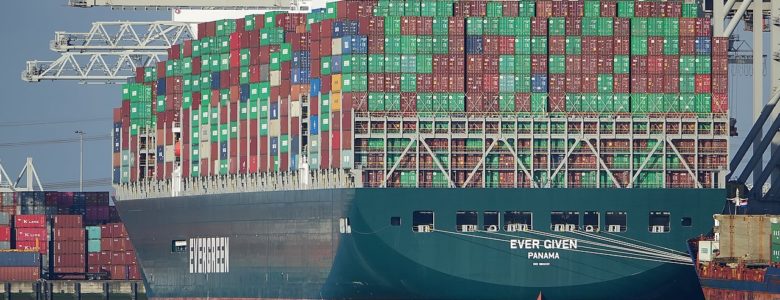
Ever Given Capitalism?
The accident with the Ever Given ship reveals — amid the COVID-19 crisis — a great fragility of the capitalist system, despite its apparatus portraying it as undefeatable and immanent.
After a single virus turned capitalism upside down, one single ship blocked one of the most important veins of trade and, hence, the flow of capital.
Over the past weeks, the news that the Ever Given had blocked the Suez Canal circulated around the world. Ever Given is an enormous container ship which — while sailing through the canal — lost course and hit the shore. The ship is so large that it jammed canal traffic for several days.
One reads in Bloomberg, The Wall Street Journal, Reuters etc., how this incident affected the global chain of supplies and how much money was lost daily. The impact that such logic of capital circulation has over nature and society is of no great concern for a system whose sole goal is to accumulate capital, which must be put into motion indefinitely as an Ever Given Capitalism.
This is because capital –- the capitalist class and relations of capital –- considers everything outside of the private sphere of production as externalities. It’s a concept that economists put forward in order to legitimise capitalist relations, creating a powerful euphemism to cover its real meaning: imposing consequences on third parties like the accident with Ever Given. Such a case helps us look at capitalism through a broader, systemic lens.
Understanding externalities
A good example of an externality is the so-called green capitalist economy, with electric cars set to substitute 1 billion combustion engine cars worldwide. This will represent immense environmental costs due to mining, not only for the parts that cars already contain but also for those needed for the batteries (if a car weights on average 1500 kg, then 1,5 billion cars would represent much more than 1,5 trillion kg of mining plus the energy used to do it).
Tesla’s not your friend
Concretely, the batteries of Tesla Cars, made in Germany with minerals from Bolivia, hold a more privileged position than the people and environment of Bolivia, which for Tesla are mere externalities. The US, legitimised by the EU, promoted a coup d’état in Bolivia to secure the exploitation of Bolivian natural resources. (Elon Musk openly bragged about it on Twitter: “We will coup whoever we want! Deal with it.”)
However, such externalities are a rhetorical, ideological trick. In fact, they are “internalities”. If a company were to consider the real impact of its operations and production, which are being absorbed and paid by entire societies all over the world, then capitalism would not be profitable.
It is a constant process of what the political economy calls primitive accumulation, which Marx corrected as “so-called primitive accumulation”: the process of private appropriation of property, wealth and resources by means of private or/and state violence, judicial power, etc. It is a circular process of domination. The example of Bolivia represents an act of primitive accumulation.
The 2008 economic crisis
Another important contemporary example is the economic crisis of 2008. Big banks went bankrupt after people were unable to pay their mortgages. Then the US-government — instead of helping those bankrupted people — gave trillions of aid to the financial system. As a result, vast amounts of public money were transferred to the financial elite, to recover the capital lost. With free money from the state, the financial elite simply took over the same homes that had triggered their collapse, securing a vast amount of the housing market without having to recur to the so-called free-market.
Externalities are just a form to disguise and reframe capitalist relations of domination. While the capitalist elite unceasingly talks about market mechanisms and competition, it uses state and monopoly power outside of market relations to secure and obtain more power.
For non-capitalists, capitalism appears highly irrational. Capitalism is irrational in that it reduces all spheres of human rationality to merely one: economic rationality. But this ‘irrational’ system is highly rational from the perspective of exploitation since it promotes a rationality of appropriation, destruction, deprivation, violence and private accumulation.
It subdues all social relations (and nature, of course) to private gain and rule. Hence, capitalist economic rationality represents a specific rationality of power, which is based on control, fear and violence, with its fundamental – and indispensable form — the private means of production.
Such power is constantly reaffirmed as an Ever Given Power, as a power relation that cannot be changed or contested. But the Ever Given accident is the perfect real analogy to Ever Given Capitalism because it reveals its fragility. Its immense size reveals stiffness, unmaneuverability, incapacity to change course of action.
The fragility of the capitalism
Ever Given may appear mighty but all it took was a minor accident to turn it impotent. The historical conditions of capitalism — with its immense transnational character of production and circulation — shows that although it has overwhelming economic and military power, a simple virus (COVID19) — or some wind — can dramatically alter its course.
Capital accumulation requires the perpetual movement of capital itself. Any fracture in its structure can bring it to a halt, and signal a possibility for change. However, to exploit this capitalist fragility, political organisation and tactics are vital to enable change from our current Ever Given Capitalism to a new post-capitalist world. Some wind or a virus alone cannot subdue the translational power elites (or the Transnational Capitalist Class).
Capitalism, or techno-feudalism?
Of course, the transnational capitalist class would rather enter a new era of Ever Given Tech-Feudalism than abdicate its power and benefits. This is effectively the system we have now, where a handful of tech firms hold huge political and economic power over entire populations, with virtually no democratic accountability.
But to do so they resort to state and private authoritarian devices like mass surveillance, censorship, propaganda, violence, etc. Our task is to create new concrete social perspectives, relations and values out of this apparent Ever Given Lack of Perspective.
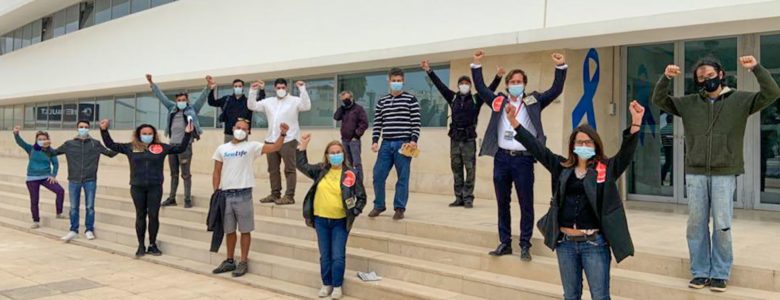
Successful activism works like this
These days, progressive grassroots activism isn’t doing much winning.
But a recent citizen-led campaign to save a piece of Portugal’s natural beauty from private development reached roughly half its goals, after running for only four weeks. And now, it’s well-positioned to continue to pursue the rest of its demands.
This campaign was part of the Campaign Accelerator programme, an incubator for grassroots actions that we developed at DiEM25. I worked on the Portugal project with the Campaign Accelerator team, and in this post I’ll look at what we did — from evaluating the idea to evaluating the project’s results — and what we learned.
1. The issue: the cliffs of Ponta Da Piedade
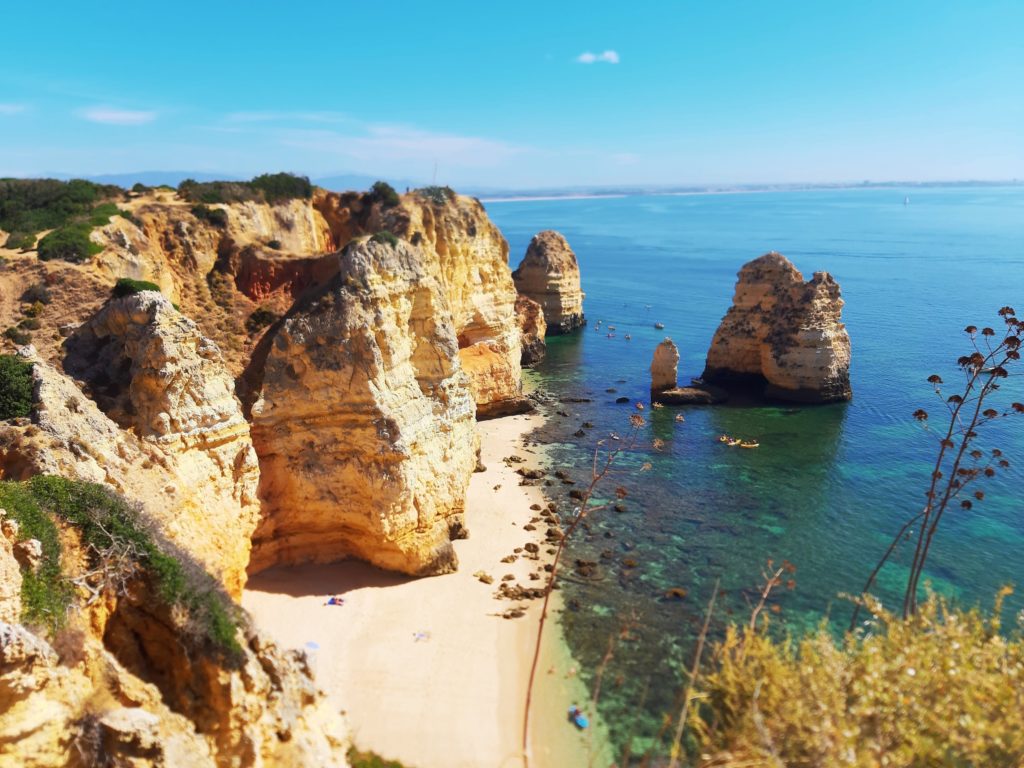
Photo by Reiseuhu / Unsplash
Jon Silva, a young activist in the south of Portugal, wrote to us with this issue:
The coastal area in Lagos, Portugal called Ponta da Piedade is used by the community as a place to enjoy nature and exercise during the COVID-19 pandemic. But it is void of any proper facilities or infrastructure, and the area has only one restaurant which has a monopolistic license. Meanwhile the remaining part of the land has been fenced off by construction companies, who are speculating on it and whose interests are being defended by local government.
This was clearly a local issue (Lagos is a town of 30,000), and we thought a campaign could make progress on it in four weeks. And we found the idea of a beauty spot fenced off by private interests intriguing and compelling.
Jon told us his Ultimate Goal was to:
Open the area for the community and create proper facilities and licenses for other businesses to better serve the people . We could prepare a project plan and present to the municipality. We could get together so the community benefits from the natural area, instead of a few private businesses.
Jon was seeking to improve his town, and already had a picture of how it could look. We dug deeper.
2. Researching the issue
Through two Zoom calls with Jon, we learned more about him and the issue.
We learned that the Ponta Da Piedade cliffs were a national treasure, which gave the story considerable PR value. Jon told us many influential residents lived near the cliffs, or had holiday houses in Lagos.
The problem was that the municipality had blocked access to the cliffs, erecting fences on the public part of the land. They hadn’t published the development plans, so the community didn’t know what was going on.
Jon had grown up in Lagos, so he was directly affected2. He had an engaging personal story: he had returned from work abroad, got sick with COVID, and now wanted to support his community. And he had a base of contacts across the area who wanted to help.
Although the campaign was in its infancy, Jon had assembled a small group of residents to help him with it. He was preparing for the long term — he planned to set up an association to have weight with the municipality, and contribute to the sustainable development of Lagos.
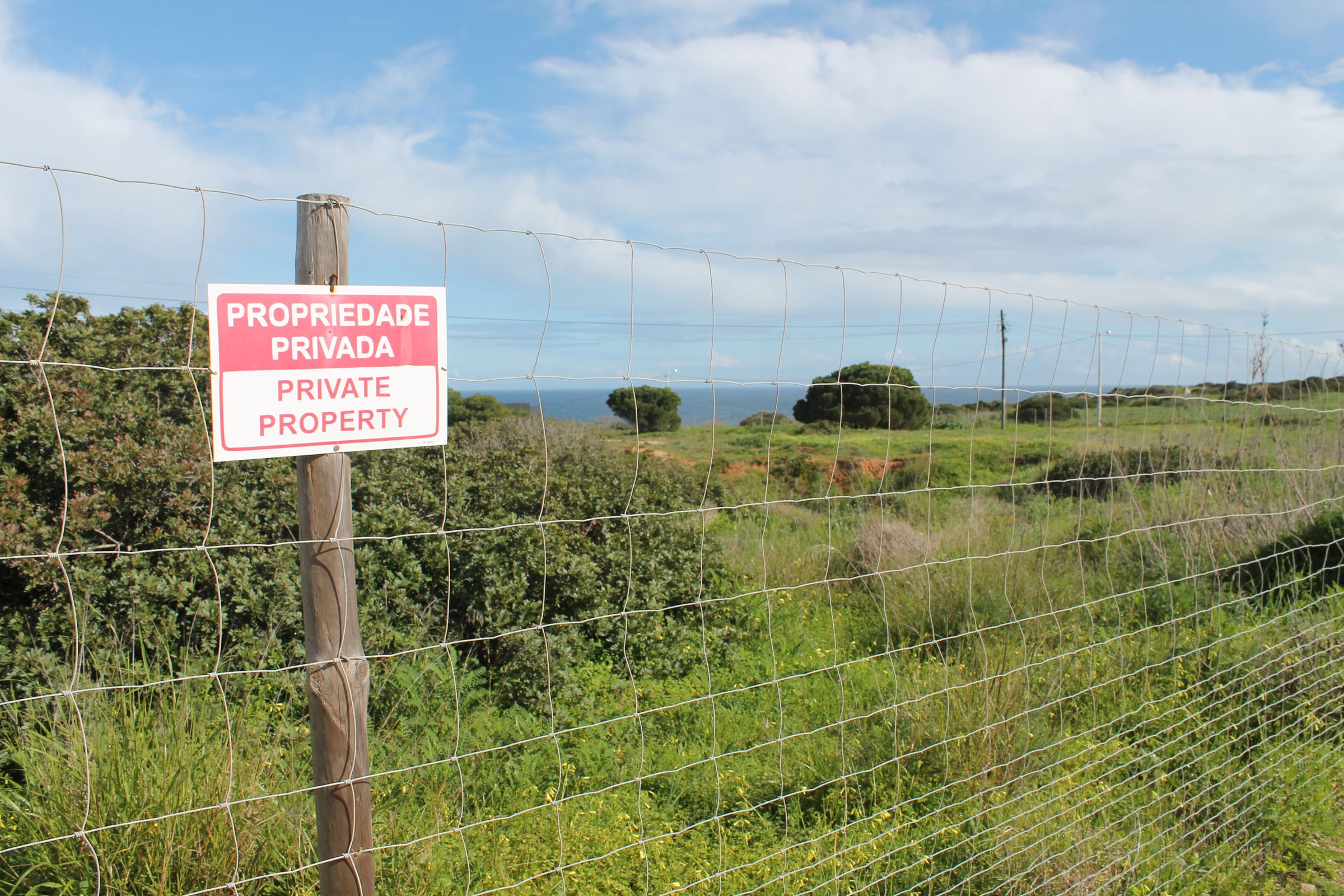
Fencing around the Ponta Da Piedade cliffs. Source: Jon Silva
This was obviously an issue we could support a campaign on, and Jon was the right person to run it. But before we could think about tactics3, we needed to narrow our focus. To concentrate on the part we could win.
3. Simplifying and focusing the campaign goals
We cut down the issue to the following:
The cliffs of Ponta da Piedade in Algarve, Portugal are one of the region’s best known natural attractions. But now, a large part of this land, both public and private, has been fenced off by private interests who are seeking to develop it. This would destroy the beauty of Ponta da Piedade, and block access to public visitors.
The campaign’s Ultimate Goal became:
The public parts of the Ponta Da Piedade cliffs are freely accessible to all. The local community helps decide what happens with the land in Ponta Da Piedade that is being targeted by private interests.
While Jon had originally wanted to work on the area’s sustainable development, we focused on the fact that private interests were targeting the land around the cliffs and, via the municipality, were blocking access to the public. We also added Jon’s idea to call for a public consultation, so the community can help decide what happens with the land.
This simplified the issue to a smaller number of actors, since the municipality was the ultimate decider who could tear down the fences, stop development, and hold a public consultation. The municipality thus became the target of the campaign. And ‘private interests versus nature for all’ was a simple, powerful message.
Lastly, we broke down the Ultimate Goal into individual objectives. Or, to see it another way, the campaign’s three demands:
We ask that the municipality:
- Removes the fences to ensure safe access to the cliffs
- Withdraws any current development plans for the cliffs, or related construction permits
- Holds a public consultation so the community can decide with the municipality how the area could best be used or developed.
4. Defining a headline to get our demands heard
How could reach these objectives in four weeks? How could we get the municipality to pay attention to our demands?
As mentioned, the municipality of Lagos was now the sole target of the campaign. So what are its pressure points? Well,
- its public image, and
- the desire to keep its constituents happy.
And as mentioned, Lagos is a holiday destination, with many wealthy and influential citizens living in the area.
So feeding all this into a brainstorm, we came up with a headline we thought the mayor would notice:
“Leading citizens of Lagos appeal to mayor to save the Ponta de Piedade cliffs from private interests”
Our tactics became about creating that headline. We’d get as many local, influential people as possible to sign an open letter calling for our demands. We’d deliver the letter to the municipality on a specified date, with a (COVID-safe) on-the-ground action. And we’d make a buzz about it all in the media that the mayor’s constituents are most likely to read… thus putting pressure on the mayor to react.
5. Generating the headline
Here are the tactics we implemented to make this headline a reality:
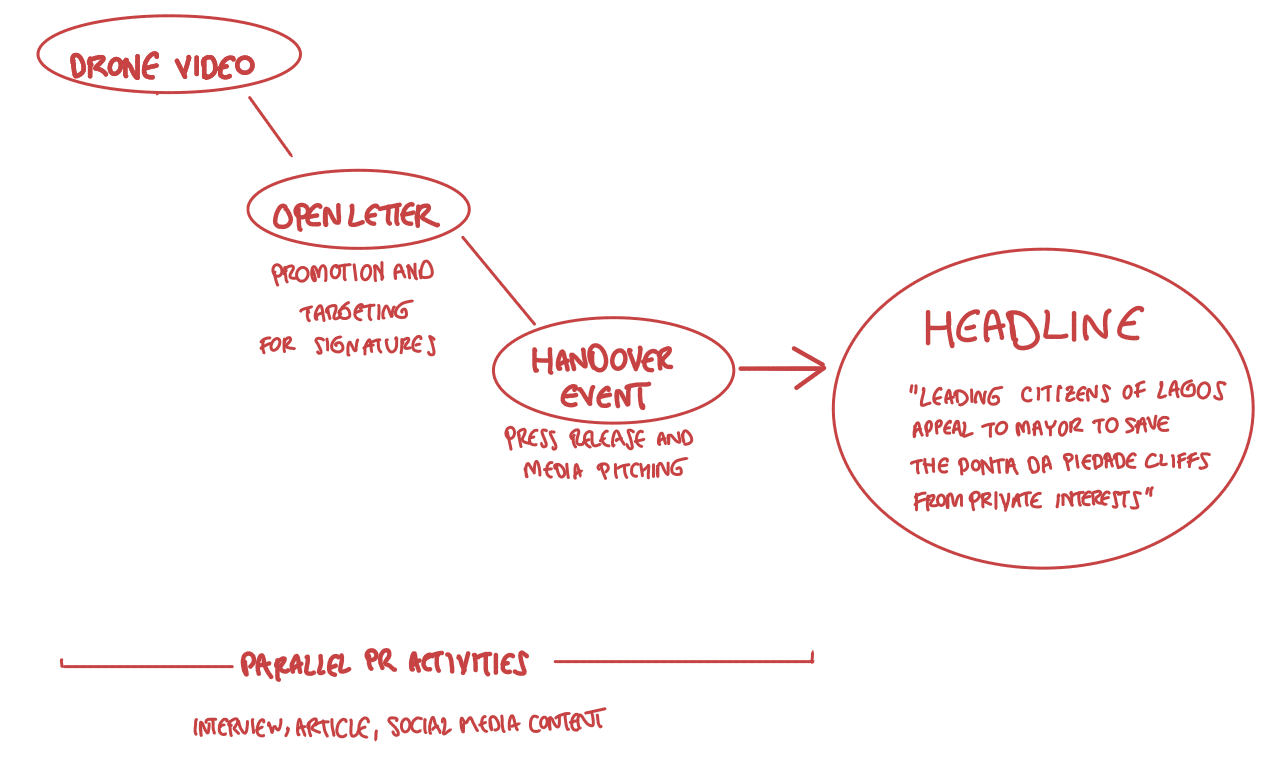
A drone video, showing the natural beauty of the ground and what’s at stake
We needed something that told the story of the campaign in less than a minute. Jon and our team found great drone footage on YouTube of the Ponta Da Piedade cliffs. He asked the creators if we could use their footage and give them credit, and most said yes. Jon also went to the cliffs and took his own footage of the parts that were fenced off.
We stitched this material together into a 54-second video with a short script and some background music. The result was this:
An open letter with our demands, easy for people to sign
Jon created a form on the site of his association, using a simple content management system from Mozello. He added the campaign demands, and embedded the drone video on the page so people could see quickly what the campaign was about.
The form needed to be as easy as possible for people to sign, so the it asked the bare minimum: name and email address. It also asked people for their occupation, so we could use this later in our PR material. And to ensure that the signatures were genuine, we asked them for the number of one of their identity documents. Lastly, we gave people the chance to include an optional message, so we could collect quotes.
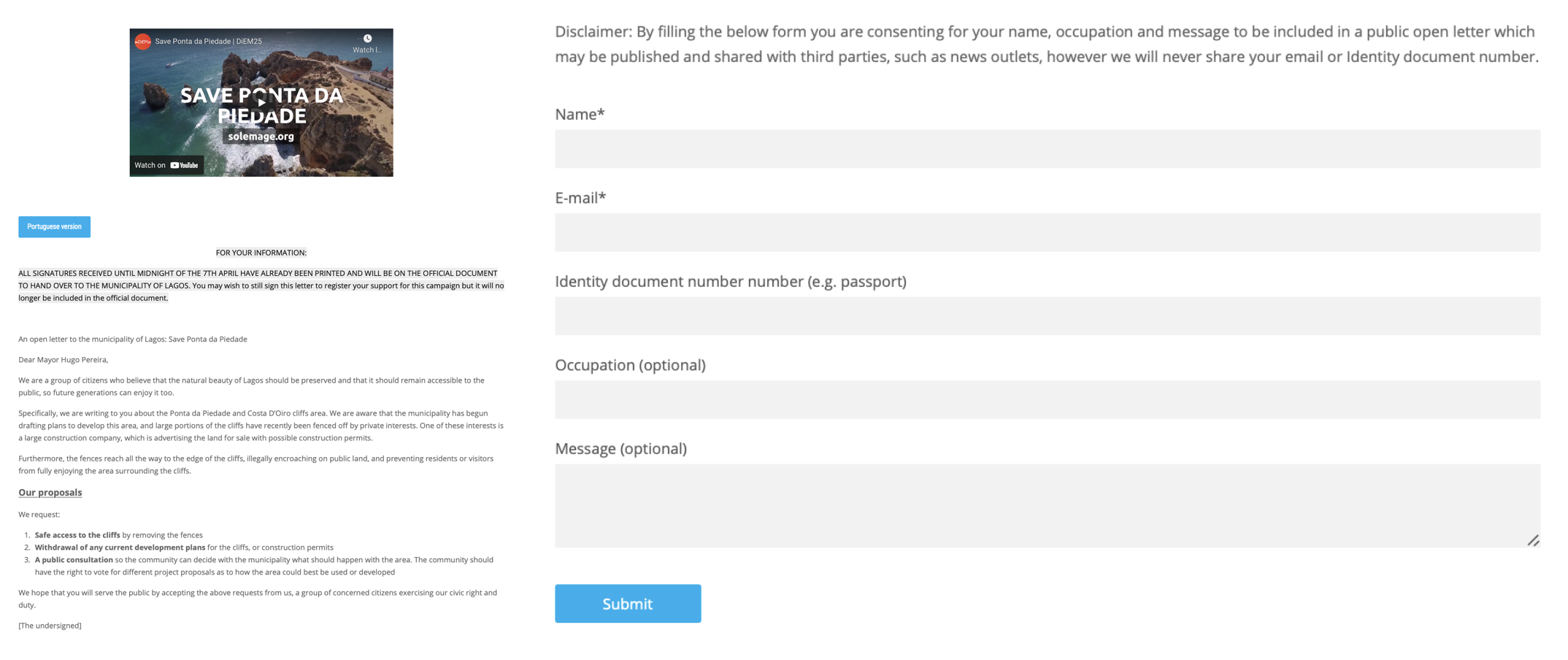
We promoted the open letter through social media, via the Facebook page of Jon’s association and DiEM25’s network. Jon and two of our team (Nadia Sales and Davide Castro, fortunately both Portuguese speakers) identified influential people that lived near the cliffs or valued them (e.g. people who had posted on social media about it). The team reached out to these targets directly, often via their social media profiles, asking if they would sign the open letter.
Parallel PR activities, to keep up interest
To maintain the campaign’s PR momentum and provide more material for it, we interviewed Jon for the DiEM25 website.
DiEM25 interviews Jon about the campaign
We also published an article on the campaign for the site, and translated all this material into Portuguese.
Meanwhile, Jon kept up interest by posting content on the Facebook page of his association. He took quotes that people had put in the form, turned them into graphics, and published them.

Some of the quote graphics that Jon created and posted on the Facebook page of his association. We got these quotes via the form on the open letter, which optionally offered people to submit a comment as they signed.
We reached out internally to the DiEM25 network in Portugal, telling our members there about the campaign and asking them to sign the letter. If we didn’t get influentials, we thought, at least we could get a large number of signatures as a backup.
Handover event: delivering the open letter the mayor, and generating PR around it
We set April 8 as the date for our ‘handover event’ — when Jon would go to Lagos Town Hall and hand over a printed copy of the open letter to the mayor. We wrote a press release, and Nadia pitched it to local, regional and national media, offering them interviews with Jon and inviting them to the action.
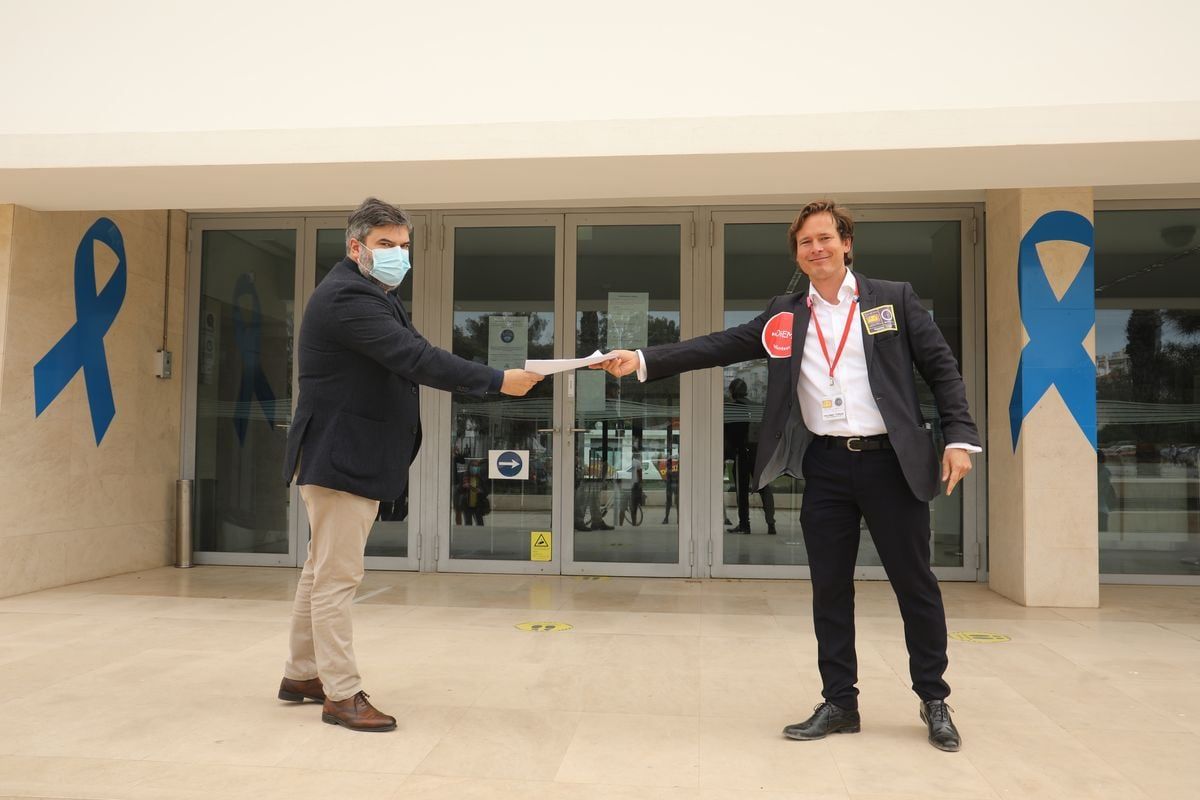
Jon hands over our open letter to the mayor of Lagos outside the town hall on April 8, 2021. Photo: Correio De Lagos
We also invited local DiEM25 members to the event, and planned a ‘stunt’ with them — a fake press conference. We asked people to bring cameras and microphones, and pretend to be interviewing Jon the steps of the town hall. The goal was to get photos and footage that we could then publish and pitch to journalists — with a wink! — to give the impression of intense media interest around saving the cliffs of Ponta Da Piedade.
6. So what happened?
Roughly half of our objectives were met
Here’s the all-important table:
| Objective | Met? | Comments |
| The municipality removes the fences to ensure safe access to the cliffs. | Almost met. At the handover event, the mayor revealed that he would remove the fencing in the public area of the cliffs. He didn’t provide a date for when it would happen, but assured that it was in process. | The campaign now has a public commitment on which to continue pressuring the mayor, and make sure the fences are removed. |
| The municipality withdraws any current development plans for the cliffs, or construction permits. | Half-met. As a result of the campaign, the mayor published the current plans for the land on the municipality’s website. The planned showed that the municipality intended to create boardwalks on the areas around the cliffs. Some minimal private development was also planned. | While this doesn’t amount to stopping development, it made a previously opaque process transparent. The public learned was that the plans to develop their area were not as damaging as they’d feared. |
| The municipality announces a date for a public consultation, so the community can decide with the municipality what should happen with the area. | Not (yet) met. | The mayor was not open to this. Jon will continue to push for it as he runs the rest of the campaign. |
Our tactics yielded good results
The outputs of our tactics were as follows:
- 500+ people signed our open letter, including Portuguese celebrities like the actress Rita Blanco and the singer Dino D’Santiago, both of whom gave us quotes that we included in the press release. Most other signatories were living in Lagos; the list included lawyers, business executives, investors, teachers and university professors, dentists, psychologists, sociologists, architects, researchers, environmental engineers, agronomists and even retired members of Lagos Council. 68 of these people gave us quotes, a selection of which we included in the press release.
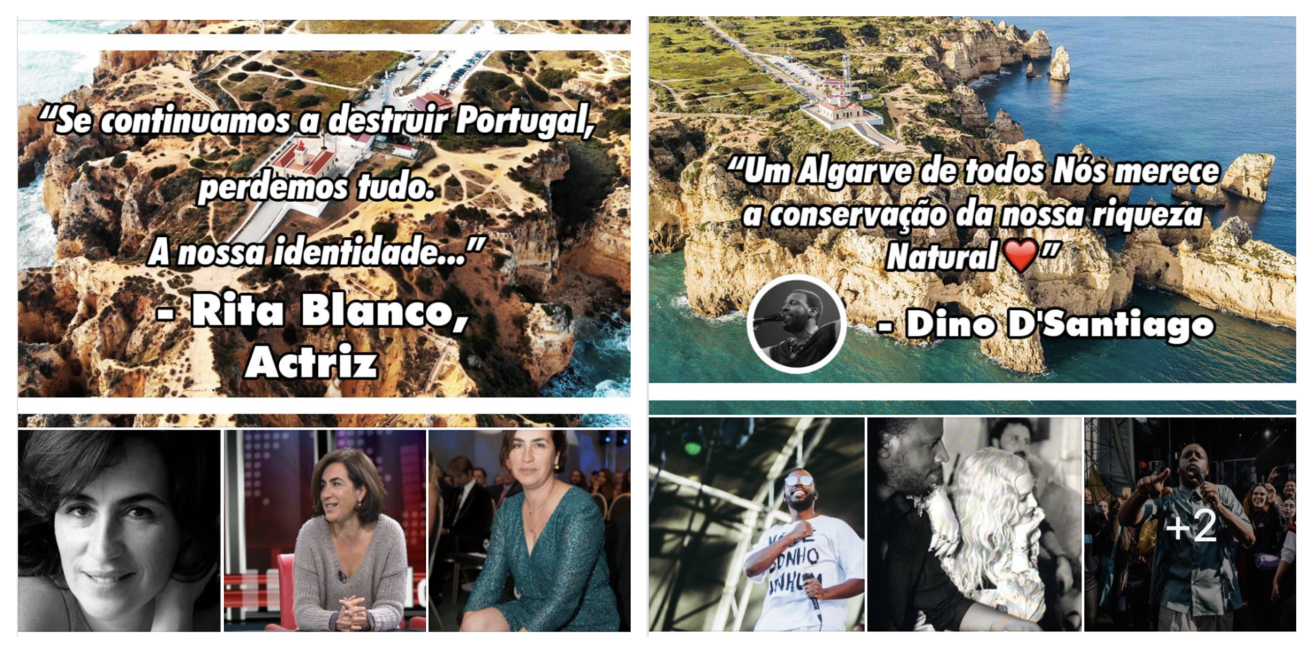
- We generated 20 pieces of positive coverage in regional media, and two in national media. The regional hits were significant, because these outlets were most likely to speak to the mayor’s constituents, and thus this coverage put more pressure on the mayor. Most coverage used the all-important headline of our press release (“Leading citizens of Lagos appeal to mayor to save the Ponta de Piedade cliffs from private interests”), and mentioned DiEM25’s role in the campaign. We were covered in Notícias ao minuto, TSF radio, Sul Informação (x2), Postal, Jornal do Algarve (x2), Algarve Primeiro, Barlavento, Região Sul, Mais Algarve, A Voz do Algarve, Correio de Lagos , CM Lagos , MoveAveiro (French), Algarve Daily News (English) (x2), Expatica (English) and Portugal Resident (English).
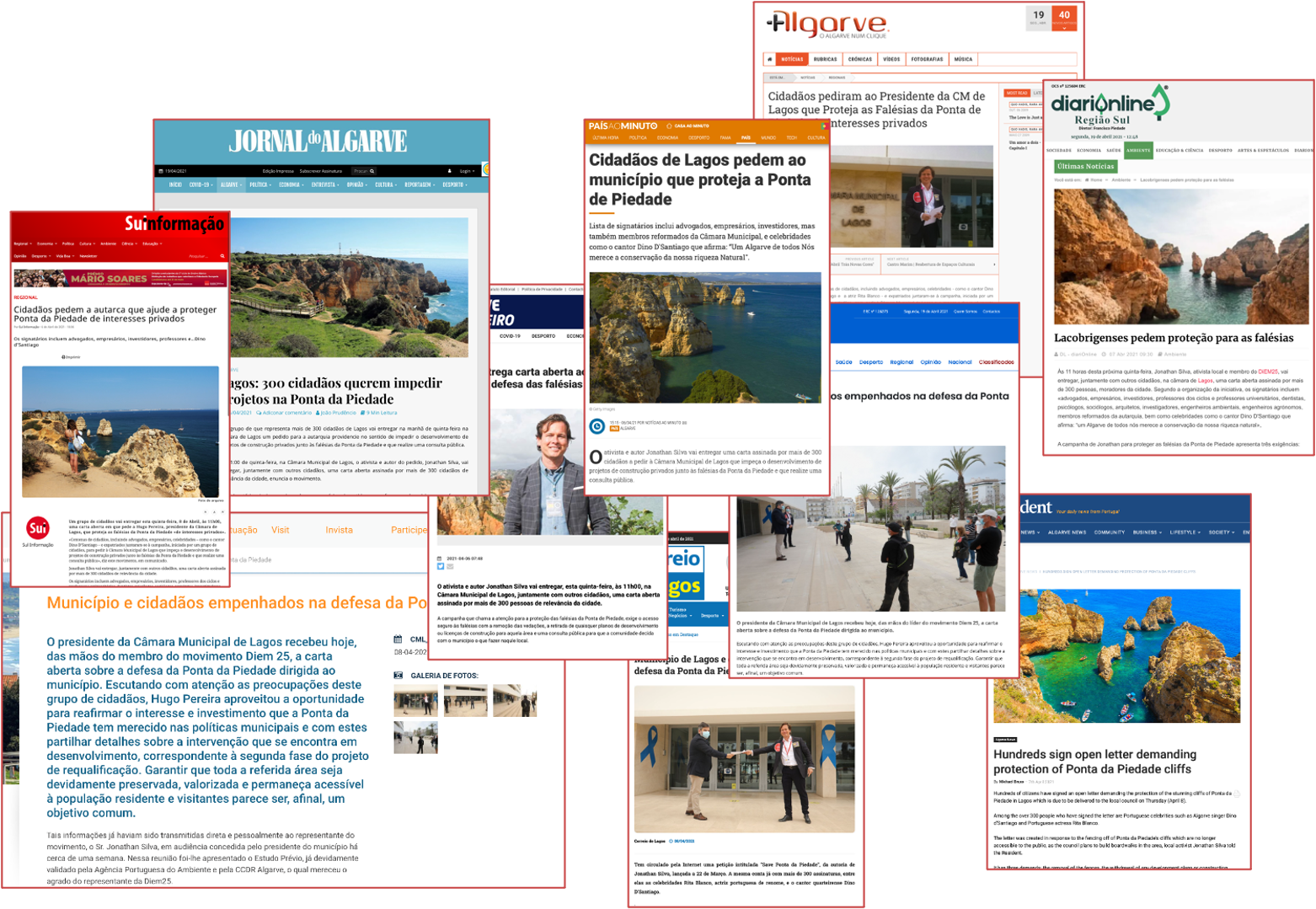
Some of the coverage we got for the campaign.
- Most articles included the angle of an active citizen — Jon — doing something for his community. We made this element dominant in the press release, and Jon gave four interviews in which he elaborated on it.
- A week before our handover event, the mayor invited Jon to a meeting. Here the municipality gave the campaign a preliminary response, indicating that the mayor was open to removing the fences. We were able to update the press release to cite this as an early victory of the campaign, which helped it generate traction.
- The mayor of Lagos attended our handover event, and was photographed with Jon. In fact, the municipality took the event so seriously that they made their own press release on it. From our side, 15 people attended the handover event. No media attended.
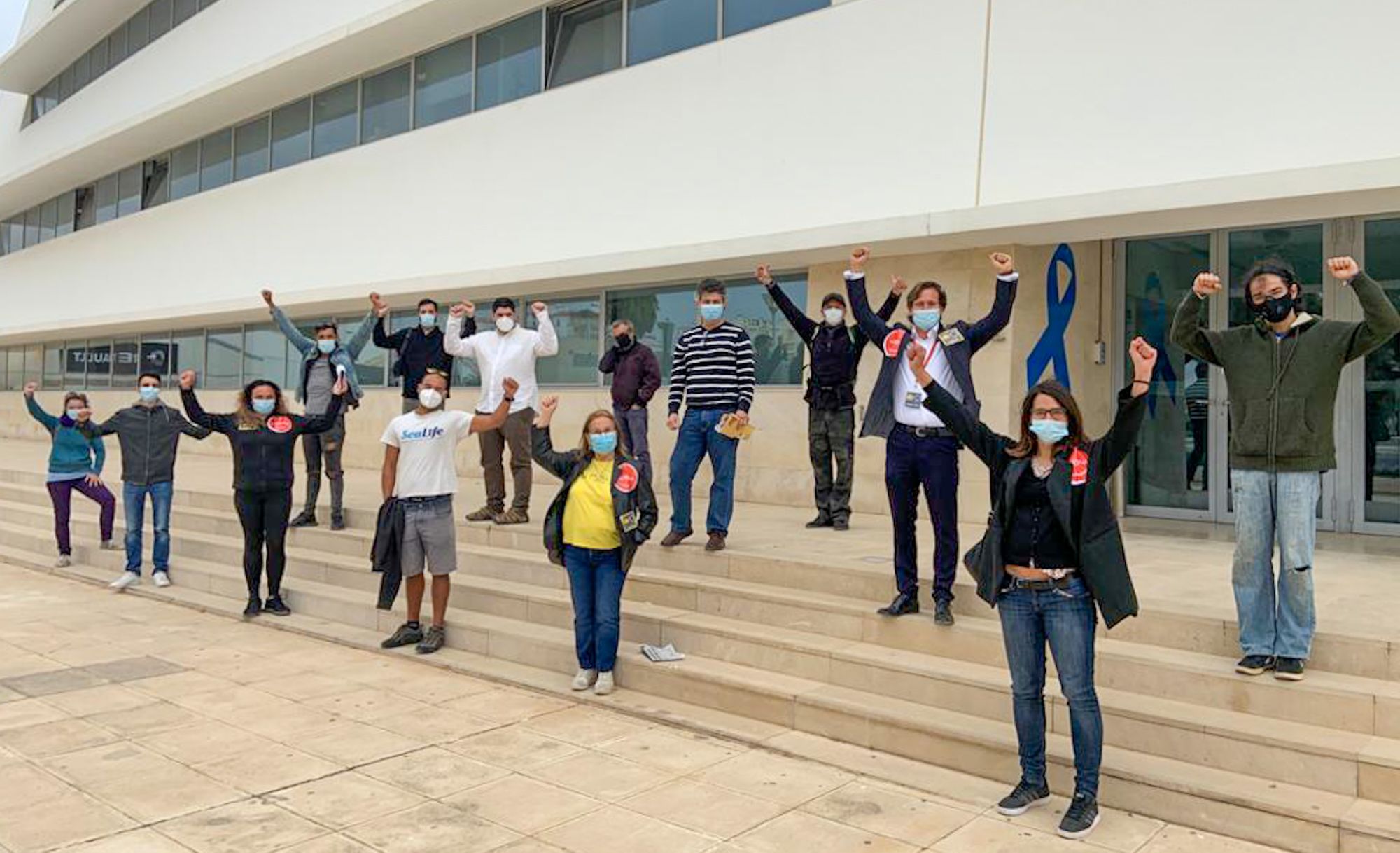
Our handover event outside the Lagos town hall on April 7, 2021. Photo: Nadia Sales
- We raised the profile of DiEM25. This will help drive membership of the movement in Portugal, and associates it with grassroots actions that make a difference.
- We positioned Jon in the media as an example that local activism can have an impact. Hopefully this will stimulate this kind of activism more generally.
- We generated a lot of material — quotes and media coverage but also photography and video — that Jon’s campaign (or others) can use to push for the sustainable development of the area.
- Organisationally, the campaign is in good shape for the future. It has a plan to work from (some of its demands are still unmet), a mailing list with hundreds of supporters, and credibility in the community and with the municipality. Furthermore, it also has legal support: a group of lawyers heard about the campaign and reached out to offer their services, free of charge.
7. Our assessment of the campaign
What worked and why?
The relative success of this campaign was down to this: the plan made sense, and Jon and the team executed it well.
The fact that Jon lived in the area, and was able to coordinate things on the ground, was important. This meant he could build a connection with the municipality, and hand over the open letter in person. It also helped that Jon had the time and means to see his campaign through. (But this was not critical to its success. With the right organisation, anyone could have followed the steps in our plan and got a result — they might just take longer to get there.)
On our side, we were fortunate that two of our team members (Nadia and Davide) knew the area and spoke the language. It was valuable that Nadia was able to travel to Lagos in person, to interview Jon and attend our handover event. And her contacts and pitching skills gave us a head start.
The success of the open letter was down to this targeted pitching, as well as the short drone video ‘advertising’ the campaign, and our efforts to reduce the friction for people to sign the letter by making the form as simple as possible.
Lastly (even if it sounds obvious), the running of the campaign was simplified by the fact that we:
- agreed our goals upfront
- ensured that our tactics were always in service of those goals, and
- worked to generate a headline rather than just doing stuff and hoping it lands.
This simplicity also made sure the team was always working to the same end.
What didn’t work and why?
- Our open letter didn’t get high numbers of signatures. With the open letter, our plan was to go for ‘quality’ (i.e. influentials, the ‘leading’ citizens of the headline we were aiming for). But quantity would have helped too, and 500+ signatures was nothing to shout about. We called out for signatures from DiEM25’s network, but didn’t get the numbers. Perhaps this was because DiEM25 is a pan-European movement, and local, grassroots activism like the Ponta Da Piedade story isn’t what people (yet) associate with it. Furthermore, the movement doesn’t have much presence in Portugal.
- Our handover event could have been better attended. As mentioned, were were able to get 15 people to show up to the handover event. This number isn’t bad for an activist event in a town the size of Lagos, and it didn’t really affect the results of the campaign. But still, planning for a larger crowd wasted our resources. And having 15 people present meant our ‘stunt’ idea of a fake press conference didn’t really work, so we didn’t get the images we wanted out of it. Why didn’t more people show? Probably because of the lack of DiEM25 members in Portugal, and our consequent inability to reach people there. COVID and bad weather didn’t help.
- We got zero international media coverage. We were aiming for local coverage with this campaign, because that’s what the mayor’s constituents were most likely to read. But it would have been valuable to have international coverage, too, in case the campaign wanted to set its activities in a wider context later on. And because wealthy foreigners have holidays houses in Lagos, and the campaign might want to target them in future. We failed on this because of internal organisation, and because we didn’t pitch properly.
8. Closing thoughts
We had an impact with this campaign. It reached roughly half its goals: it pushed the mayor to remove the fencing the public area of the cliffs, allowing people to enjoy their natural beauty once more. And the campaign compelled him to reveal the development plans for the area.
We did get lucky — the planned developments were not as bad as feared, so the headline we aimed for (‘Save Ponta Da Piedade’) even became hyperbolic. But we forced transparency on the issue, and set a precedent for the area of Lagos in case developers get tempted to plan hotels or resorts that damage the landscape.
With the campaign, we created a template for future actions. Anyone seeking to protect beauty spots from private interests can tweak these tactics and learn from our experience. We promoted DiEM25 in a country where it still has a low presence, and helped connect the movement to successful local activism.
We’ve also verified once again that the Campaign Accelerator programme works. It helps grassroots activists generate impact, and promotes rigorous, results-oriented activism that has world-changing potential.
Jon’s campaign continues. And for us — the next Campaign Accelerator cycle starts later this year.
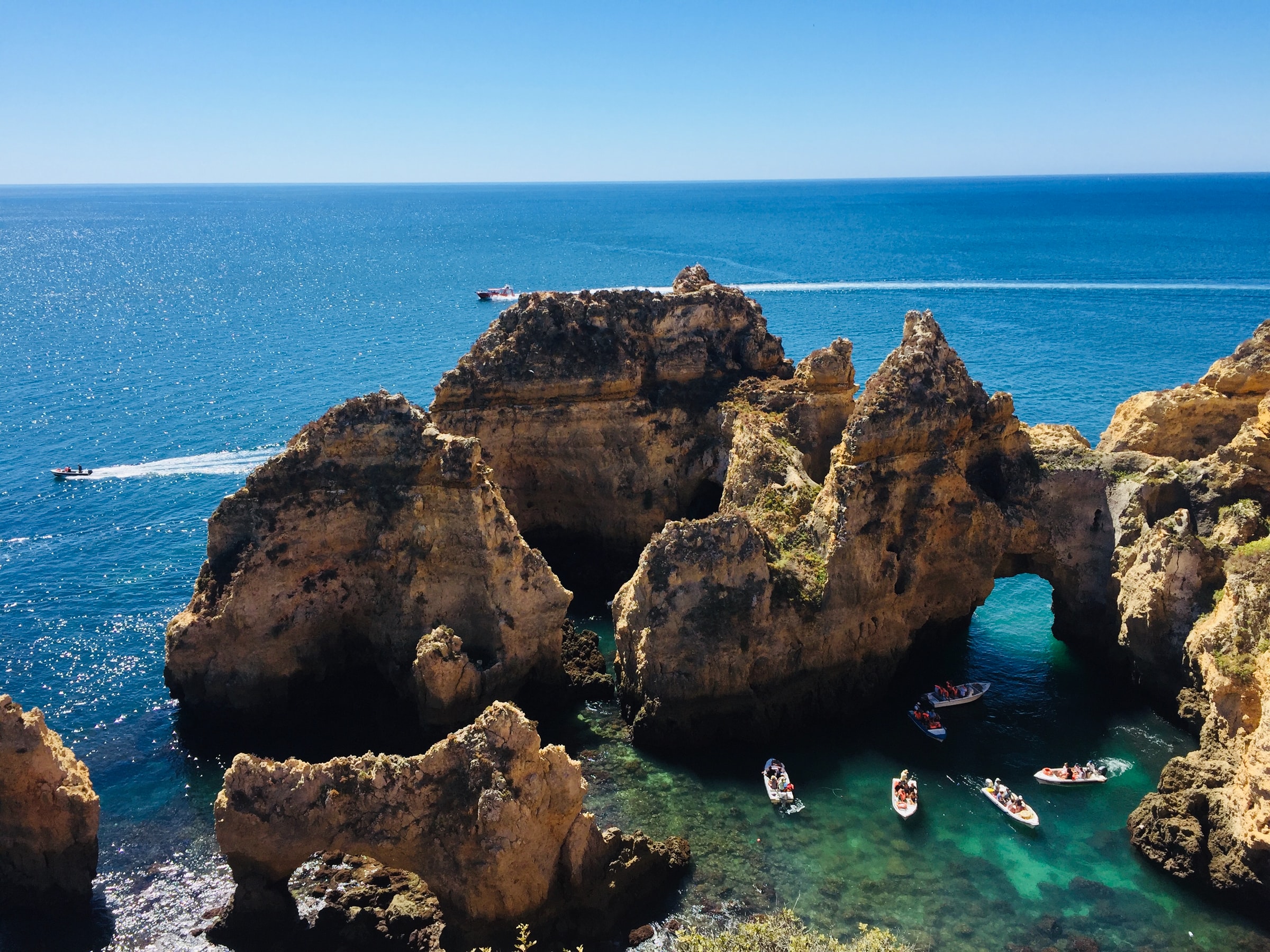
Photo by Cristiano Pinto / Unsplash
Footnotes
1: Campaign Accelerator is a programme we developed to support targeted, local, grassroots campaigns by individual activists. People apply to have their proposals considered; the Campaign Accelerator team and I choose three applications which we think could have impact; and develop a plan for each. We then help the applicants execute their campaigns over four weeks. One of the three winning campaigns was the one cited in this post.
2: It’s hard to build an impactful campaign without involving people directly affected by the issue. So the fact that the Jon was affected and was on the ground, immediately gave this campaign an advantage.
3: In a recent activism workshop I attended, Nadine Bloch of Beautiful Trouble said of tactics “[They’re] those sexy things that make everyone interested in doing something. But they do actually need to deliver on your big vision.” Activists often rush into a campaign with a list of tactics, ignoring their Ultimate Goal and the preparatory work that should precede it. But doing this means your campaign becomes tactics-led. It can lose its way and become a scattergun campaign. Or one that generates a lot of noise and no impact.
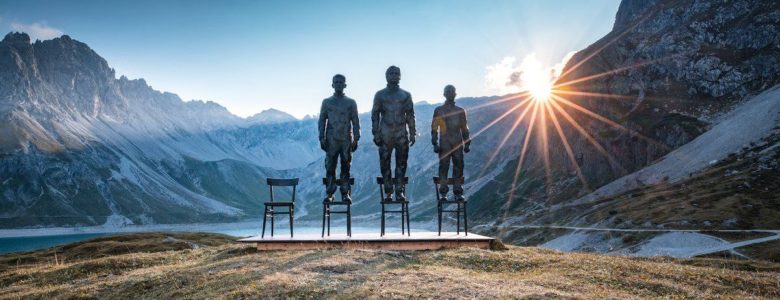
Presenting the new DiEM Voice website!
Against the backdrop of the Covid-19 pandemic and the devastating impact it has had on the arts sector, it became apparent that it was time for DiEM Voice to be revived.
So here we are with our brand-new website and we invite you to come be a part of the redevelopment of DiEM25’s arts and culture platform!
In DiEM Voice artists can find a common space to reflect together and turn their ideas and creativity into rich political messages that promotes DiEM25’s radical proposals for social justice, transparency, a green transition to a new economic model, and the conviction that transnational action is the only arena to effect change.
We need you as politically conscious artists to help shape DiEM25’s political campaigns and initiatives; to contribute to building a new creative vision for Europe as we navigate through these uncertain times for the arts.
Come take a look at our website to learn more about us and our mission.
Also check out our ‘Raise your voice for Assange’ campaign, our first open call to artists to use their voice and join the fight for freedom of Julian Assange.
Sign up to Voice’s newsletter on the bottom of the website and follow us on social media to keep updated on the ways you can participate!
Photo (c) Davide DorminoⓒLucas Tiefenthaler
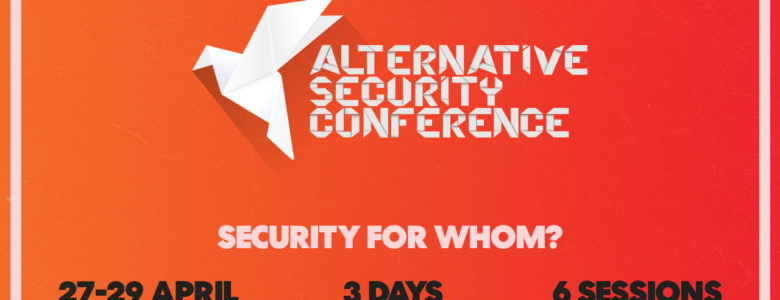
DiEM25 invites you to its first-ever Alternative Security Conference
The Munich Security Conference
The Munich Security Conference proposes to be an institution of freedom, peace and security in the world. Each February (this year later, due to the coronavirus pandemic) it gathers leaders from around the globe; from business-circles, politics, the media, academia, the military and some non-governmental organisations, to discuss what its hosts understand to be the most pressing security issues of our time.
The rise of “Westlessness“
Last year the motto under which the leaders of the free world met was “Westlessness“; an obnoxious term used to represent the alleged loss of the West’s way in the world, its standing and credibility as a proponent of peace and general welfare in the international community.
An unwelcome development brought about in recent years by a surge of reactionary parties and figures in western countries; like ex-US-president Donald Trump, Matteo Salvini in Italy, Victor Orbán in Hungary, Marine-Le Pen in France, the alt-right movements that complement them in Germany, like the Alternative für Deutschland, The Golden Dawn in Greece, the Freiheitliche Partei Österreichs in Austria, the Brexit-Party of Nigel Farage in Great-Britain; ugly out-growths, all of the same rot, plaguing those countries in the past few decades: Neoliberalism — the shuffling of wealth and power into the hands of a few multinational corporations and ultra-wealthy stock-holders — leaving most of the population cast aside and suffering the consequences.
Prompting responses that remind us of former times in history, when populations where disenfranchised and not given a voice by those who were in power, bringing them to vote in leaders who would promise them the world if only they followed their rule.
Overcoming “Westlessness“ – their way and ours
The leaders of the free world might not be happy to see these developments take place in recent years, they aren’t however prepared to give up easily on the West because of them. So they proclaim: “We are not neutral. We are not somewhere “in the middle“. We are and will continue to be part of the West!” (Annegret Kramp-Karrenbauer, Defense Minister of Germany, describing Germany’s and Europe’s stance toward the problem of “Westlessness“ in her talk at the MSC 2020); stating Westernness as an idea, not as a region to be found on a map.
Everyone can be part of “the West“; and indeed the West would like everyone to be a part of it, if only they adhere to its principles. These are not the famous ones: democracy, freedom, general well-fare for all peoples, that one reads about in the press or academic articles on Western idealism or hears reverberating in the halls of the Bayerische Hof, where the Munich Security conference takes place every year (under heavy police protection to keep unwelcome visitors, like the general population, out).
These are the principles that indeed govern it: corporate and state interests, closely interlinked with each other; states being the most powerful servants of corporate power and corporations being the most dominant influence on states.
These are the forces, that in their all-too close marriage in the last decades in the Western world, have brought about much of the suffering which its leaders now allegedly lament: the rise of fascistic movements, an upsurge in reactionary sentiment among populations, a forgetfulness of historic patterns that have brought about some of the most horrendous forms of conduct ever to exist between human beings.
It is therefore that we cannot take seriously the proclamations of figure’s like Annegret Kramp-Karrenbauer to remain in the West; if being in the West means bringing about these atrocious forms and condoning the forces that bear them.
An Alternative Security Conference
If we wish to free ourselves from these bondages we must first of all free ourselves from the guises of freedom and equality, democracy and altruism, which the West casts over the world wherever its shadows run. It is from this need that our, DiEM25 Alternative Security Conference is born: to cast some light where these shadows have been thrown and to expose the powers that operate from within them.
It is this concern that leads us as a foreign policy group from within DiEM25, to set a counter-example to the yearly Munich Security Conference. To hand people an alternative view on security policy questions than the ones they hear or read about in the mainstream press and political discourse each day. To question the existing paradigms of security and to offer alternate ones in their place.
Is it, for instance, necessary that Europe build an army to defend itself? Against what security threats, one might ask, in the first place? Is a rise in arms production legitimate in the Western world today? Who are we defending ourselves against? Who is benefitting from the increase in arms sales? Who is hurt by weapons we sell to foreign countries engaged in conflicts, like the Saudi regime in the war in Yemen? Who are we, the West in general? What does the term even mean? Why is their security (meaning: that of everyone outside the West) less important than ours? How can states talk of security to their populations while at the same time letting the worst ever security crises -= with the climate crisis and the little-talked about but existent threat of nuclear war — unfold? What are we to make of such contradictions in state policy and the talks and speeches we are offered by our alleged leaders?
Join us to answer such and many other related questions from April 27 – 29 at the “Alternative Security Conference“. The event can be followed on DiEM25’s Youtube channel. More information about the conference.
We will begin with a session on general security questions on the Tuesday (27th), move on to more specific forms of human and other kinds of security later in the evening, continue with those on Wednesday (28th) and partly Thursday (29th), and finally end on a note about modern-day imperialism and it’s contemporary disguises on Thursday evening.
We invite you to the first ever Alternative Security Conference hosted by DiEM25! Join us when we try to expose the powers that reside in the dark and thereby take the first step in overcoming them!